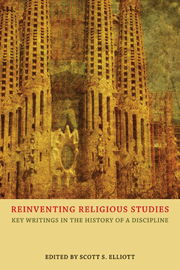Book contents
- Frontmatter
- Contents
- Introduction
- 1 For such a time as this: the Council of Societies for the Study of Religion, 1969–2009
- Part I Inventing and reinventing the field of religious studies
- Part II Method and theory in religious studies
- Part III Teaching religion
- Part IV Women and the bible in religious studies
- Part V Religion and religious studies in civic life
- 24 Contemporary socio-political change and the work of religious studies
- 25 The scholar of religion as a cultural critic: perspectives from Denmark
- 26 What are the humanities and why do they matter? The case of religion and public life
- 27 Response to Gary Lease's “What are the humanities, and why do they matter?”
- 28 So, what are we professing here? Religion, the liberal arts, and civic life
- 29 Response to Raymond B. Williams's “So, what are we professing here? Religion, the liberal arts, and civic life”
- 30 Response to Raymond B. Williams's “So, what are we professing here? Religion, the liberal arts, and civic life”
- 31 Response to Raymond B. Williams's “So, what are we professing here? Religion, the liberal arts, and civic life”
- 32 Rejoinder
- Part VI Religious studies and identity politics
- Part VII Islam and 9/11
- Bibliography
- Acknowledgments
- Index
28 - So, what are we professing here? Religion, the liberal arts, and civic life
from Part V - Religion and religious studies in civic life
- Frontmatter
- Contents
- Introduction
- 1 For such a time as this: the Council of Societies for the Study of Religion, 1969–2009
- Part I Inventing and reinventing the field of religious studies
- Part II Method and theory in religious studies
- Part III Teaching religion
- Part IV Women and the bible in religious studies
- Part V Religion and religious studies in civic life
- 24 Contemporary socio-political change and the work of religious studies
- 25 The scholar of religion as a cultural critic: perspectives from Denmark
- 26 What are the humanities and why do they matter? The case of religion and public life
- 27 Response to Gary Lease's “What are the humanities, and why do they matter?”
- 28 So, what are we professing here? Religion, the liberal arts, and civic life
- 29 Response to Raymond B. Williams's “So, what are we professing here? Religion, the liberal arts, and civic life”
- 30 Response to Raymond B. Williams's “So, what are we professing here? Religion, the liberal arts, and civic life”
- 31 Response to Raymond B. Williams's “So, what are we professing here? Religion, the liberal arts, and civic life”
- 32 Rejoinder
- Part VI Religious studies and identity politics
- Part VII Islam and 9/11
- Bibliography
- Acknowledgments
- Index
Summary
I am deeply honored by the opportunity to meet with graduate students at lunch and to speak at this departmental colloquium. The School of Religion at Iowa has occupied a premier position in public, university study of religion in America. When I went to graduate school, it was Chicago, Harvard, Yale, Duke, and Iowa. Iowa was known especially for American religion and Sidney Mead. You have a venerable tradition here. Hence, I hope to honor that tradition with the subtitle “Religion, the Liberal Arts, and Civic Life.”
More problematic, however, is the provocative part of the title, “So, what are we professing here?” I intend to provoke discussion, not conflict, with some fundamental questions: Why do you want to teach? What are your goals? How do you balance advocacy and commitment/specialization and interrelatedness? What does it mean to have an excellent School of Religion and not just a collection of teaching scholars? What social good do you serve?
I know the mantras: (1) “Research I universities are committed to free and open, critical inquiry” and (2) “Study of the liberal arts is an end in itself.” I have even chanted the mantras to protect academic freedom and to escape utilitarian bondage. However, this afternoon I want to push the questions: Study of what, exactly? And, to what social end? The questions are problematic because they immediately raise the two-headed beast of the academic apocalypse now: (1) Canon (that is, What do we study? and Where is coherence?) and (2) Market (Why do we study? and Where is its relevance?).
- Type
- Chapter
- Information
- Reinventing Religious StudiesKey Writings in the History of a Discipline, pp. 182 - 190Publisher: Acumen PublishingPrint publication year: 2013



